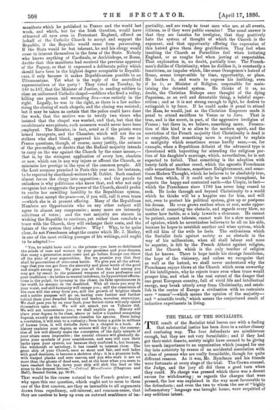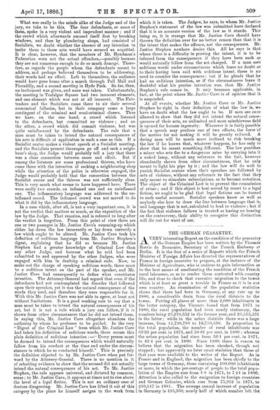THE TRIAL OF THE SOCIALISTS.
THE result of the Socialist trial leaves one with a feeling that substantial justice has been done in a rather clumsy and confusing way. The four defendants are mischievous enough, but they are not very formidable ; and if they had got their strict deserts, society might have seemed to be giving too much importance to an organisation which jumped for one day into notoriety by reason of an accidental association with a class of persons who are really formidable, though for quite different reasons. As it was, Mr. Hyndman and his friends were fortunate at every stage of the trial. The Crown counsel, the Judge, and the jury all did them a good turn when they could. No charge was pressed which there was a decent excuse for withdrawing ; as regards the charges that were pressed, the law was explained in the way most favourable to the defendants ; and even the two to whom the use of "highly inflammatory" language was brought home, were acquitted of any seditious intent. What was really in the minds alike of the Judge and of the jury, we take to be this. The four defendants, or some of them, spoke in a very violent and imprudent manner ; and if the crowd which afterwards amused itself first by breaking windows, and then by plundering shops, had consisted of Socialists, we doubt whether the absence of any intention to incite them to these acts would have secured an acquittal. It is clear, however, that the members of Mr. Hyndman's Federation were not the actual offenders,—possibly because they are not numerous enough to do so much damage. There- fore, as regards the people whom the defendants meant to address, and perhaps believed themselves to be addressing, their words had no effect. Left to themselves, the audience would have gone home after a march through Pall Mall and Piccadilly, and a second meeting in Hyde Park. So far, then, no incitement was given, and none was taken. Unfortunately, the meeting in Trafalgar Square had two innocent elements, and one element which was not at all innocent. The Fair- traders and the Socialists came there to air their several economical fallacies, but in their company came a large contingent of the criminal and semi-criminal classes. Thus we have, on the one hand, a crowd which listened to the defendants, but committed no violence ; and on the other, a crowd which did commit violence, but was quite uninfluenced by the defendants. The rule that a man must be taken to intend the natural consequences of his acts is difficult of application in such a case as this. If a Socialist orator makes a violent speech at a Socialist meeting, and the Socialists present thereupon go off and sack a neigh- bour's shop, the Judge would probably tell a jury that there was a clear connection between cause and effect. But if among the listeners are some professional thieves, who have come there with the intention of sacking a neighbouring shop while the attention of the police is otherwise engaged, the Judge would probably hold that the connection between the Socialist orator and the thieves was not sufficiently clear. This is very much what seems to have happened here. There were really two crowds, an inflamed one and an uninflamed one. The inflammatory language was addressed to the un- inflamed crowd. The inflamed crowd was not moved to do what it did by the inflammatory language.
In a case which, after all, is not a very important one, it is not the verdict that matters so much, as the exposition of the law by the Judge. That remains, and is referred to long after the verdict is forgotten. From this point of view there are one or two passages in Mr. Justice Cave's summing-up which either lay down the law incorrectly or lay down correctly a law which ought to be altered. Mr. Justice Cave took his definition of seditious language from Mr. Justice Stephen's digest, explaining that he did so because Mr. Justice Stephen had a greater knowledge of Criminal Law than any other Judge, and because what he said had been submitted to and approved by the other Judges, who were engaged with him in drafting- a criminal code. Now, to make out the charge of speaking seditious words, there must be a seditious intent on the part of the speaker, and Mr. Justice Cave had consequently to define what constitutes intention. The Attorney-General had argued that even if the defendants had not contemplated the disorder that followed upon their speeches, yet it was the natural consequence of the words they used, and therefore they were responsible for it. With this Mr. Justice Cave was not able to agree, at least not without limitations. It is a good working rule to say that a man must be taken to intend the natural consequences of his act, but it is not a rule which a jury can follow, if it is shown from other circumstances that he did not intend them. In saying this, Mr. Justice Cave altogether abandons the authority by whom he professes to be guided. In the very "Digest of the Criminal Law " from which Mr. Justice Cave had taken his definition of seditious words, there occurs this plain definition of seditious intention :—" Every person must be deemed to intend the consequences which would naturally follow from his conduct at the time and under the circum- stances in which he so conducted himself." This is precisely the definition objected to by Mr. Justice Cave when put for- ward by the Attorney-General. There is no mention in it of rebutting evidence to show that the accused did not actually intend the natural consequences of his act. To Mr. Justice Stephen, the rule appears universal, and dictated by common, sense ; to Mr. Justice Cave, it appears at times not to rise above the level of a legal fiction. This is not an ordinary case of doctors disagreeing. Mr. Justice Cave has lifted it out of this category by the place he himself assigns to the work from which it is taken. The Judges, he says, to whom Mr. Justice Stephen's statement of the law was submitted have declared that it is an accurate version of the law as it stands. This being so, it is strange that Mr. Justice Cave should have thrown the definition over for no better reason than that it is the intent that makes the offence, not the consequences. Mr. Justice Stephen nowhere denies this. All he says is that where there is a difficulty in proving the intent, it is to be inferred from the consequences, if they have been such as would naturally follow from the act charged. If a man uses seditious words under circumstances which leave no doubt as to their having been said with seditious intent, there is no need to consider the consequences ; but if he pleads that he had no seditious intention, or if the circumstances leave it doubtful what his precise intention was, then Mr. Justice Stephen's rule comes in. It only becomes applicable, in fact, at the point where Mr. Justice Cave is of opinion that it is suspended. At all events, whether Mr. Justice Cave or Mr. Justice Stephen be right in their definition of what the law is, we have no doubt what the law ought to be. If men are once allowed to show that they did not intend the natural conse- quences of their acts, an unlimited and most mischievous field is opened for human ingenuity. Wherever it is fairly possible that a speech may produce one of two effects, the force of the motive for not making it will be greatly reduced. A daring man will be much more inclined to risk breaking the law if he knows that, whatever happens, he has only to show that he meant something different. The law punishes a miner who sets fire to a dangerous mine by carrying into it a naked lamp, without any reference to the fact, however abundantly shown from other circumstances, that he only meant to light his pipe by it ; and the law will do well to punish Socialist orators when their speeches are followed by acts of violence, without any reference to the fact that they only meant to stimulate subscriptions, or to become notorious. The object of the Criminal Law is to prevent the commission of crime ; and if this object is best served by resort to a legal fiction, we ought to be glad that legal fictions can be turned to such useful account. Socialist speakers know as well as anybody else how to draw the line between language that is, and language that is not, calculated to lead to violence ; but if the fact that violence follows is treated as having no bearing on the controversy, their ability to recognise this distinction. will die out for want of use.



































 Previous page
Previous page